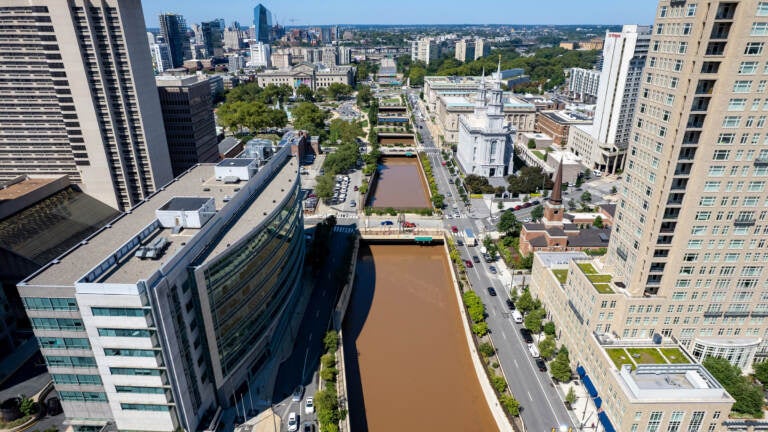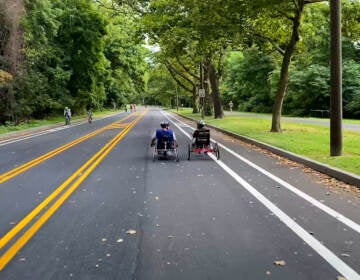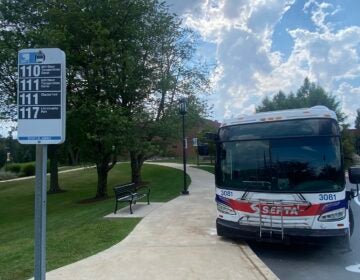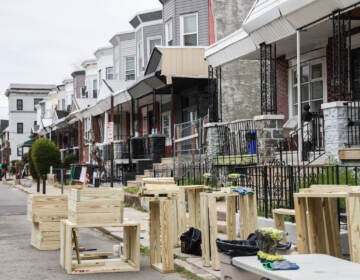Citing climate change, Delaware Valley Regional Planning Commission board member abstains from vote on agency plan
The former chair of the Delaware Valley Regional Planning Commission board abstained from a vote on the agency’s long-term plan citing climate change.

I-676 is filled with floodwater in the wake of Hurricane Ida in 2021. (Mark Henninger/Imagic Digital)
Citing concerns about a failure to adequately address climate change, the former chair of the Delaware Valley Regional Planning Commission board abstained from a vote on the four-year plan that will guide federal transportation spending in the region over the next three decades.
Despite the notable abstention from City Councilmember Mark Squilla, who represents the city on the board and served as chair until June 30, the DVRPC approved the “Connections2050” plan — a federally mandated document that will shape nearly $68 billion in infrastructure spending over the next three decades and proposes nearly $90 billion more.
The councilman whose district includes neighborhoods that run along the river from the Frankford section of Kensington to his native South Philadelphia said that recent events, like the unprecedented flooding of Interstate 676, demonstrate that more drastic action was needed to prepare the region for climate change.
“Reflecting on the climate crisis, we need to reevaluate all of our plans and policies. This was even more so after the flooding a few weeks ago,” he wrote after the Thursday DVRPC vote. “After discussing with OTIS and others in the administration, we think a stronger pivot to sustainable, equitable mobility is needed.”
DVRPC, which oversees nine counties across Pa. and NJ, is one of 408 federal metropolitan planning organizations in the United States charged with creating plans every four years that will guide billions of dollars in annual federal transportation and infrastructure spending.
The “Connections 2050” plan contains a roughly even split of some $48 billion of highway and transit projects in Philadelphia, but also another $19.5 billion in New Jersey that is more heavily weighted towards highway spending. The full plan contains more than 80 different roadway expansion projects. None of the proposed transit projects are fully funded.
Still, DVRPC officials countered that 44% of total available funding would be earmarked for transit and less than 3% of funding would go toward projects that add capacity to existing roadways.
DVRPC spokesperson Natalie Scott highlighted environmental priorities included in the plan, which must cover the needs of urban areas such as Philadelphia and Camden as well as outlying suburban, exurban and rural areas with few existing transit options.
“Connections 2050 establishes a vision for the growth and development of the region and serves as a blueprint for prioritizing transportation capital projects,” she said. “The plan identifies a range of strategies to mitigate climate change, including focusing jobs and housing in existing or planned centers where there is infrastructure to support it, moving to electric vehicles, and increasing the region’s travel options by building an interconnected bicycle and pedestrian network and investing in transit infrastructure.”
But some critics said that while elements of the larger plan were laudable, road widening or highway expansion projects no longer belonged in regional transit plans.
Ben She, from urbanist political action committee 5th Square, noted that funding is often set as state or federal and that DVRPC is limited in its abilities to independently propose or regulate infrastructure projects. However, he said it was not incumbent on the organization to “rubber stamp” projects out of step with stated policy goals of reducing car dependence and reducing carbon emissions.
Sarah Clark Stuart, from the Bicycle Coalition of Greater Philadelphia, similarly critiqued the DVRPC plan, calling Squilla’s abstention a “significant” step but also called for more decisive action.
“It’s a reflection of the hundreds of public comments received by DVRPC that decried any funding going towards road expansion and the lack of near-term programmed funding for bicycle-pedestrian projects,” she wrote, in a statement. “A ‘no’ vote might have sent an even stronger signal, but their abstention is noteworthy.”
For its part, Scott said DVRPC would continue listening and revising planning priorities going forward.
“The plan enables the region to receive more than one billion dollars annually in federal transportation funding and must be updated every four years to better respond
to a rapidly changing world,” she said. “DVRPC continues to work collaboratively with its regional planning partners to build consensus on best meeting the unique travel needs of different types of communities in a diverse nine-county, bi-state region.”

Subscribe to PlanPhilly
WHYY is your source for fact-based, in-depth journalism and information. As a nonprofit organization, we rely on financial support from readers like you. Please give today.









